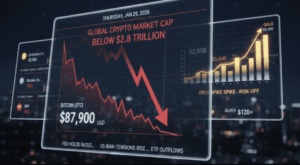A quiet revolution is unfolding in the world of cryptocurrency. Big Bitcoin holders are increasingly moving their digital wealth off the blockchain and onto Wall Street’s balance sheet, without actually selling a single coin.
A new wave of Bitcoin exchange-traded funds (ETFs) is allowing the crypto rich to fold their fortunes into the regulated financial system through funds managed by traditional giants like BlackRock Inc. and Bitwise Asset Management.
The Regulatory Shift That Changed Everything
This summer, regulators approved a key mechanism for Bitcoin ETFs known as “in-kind transactions.” Common across most ETFs, this process allows investors to hand over their Bitcoin to a fund in exchange for ETF shares — without triggering a taxable sale. No cash changes hands; instead, the digital asset is swapped for a fund position, turning volatile crypto holdings into a line item on a brokerage statement.
The benefits are significant. Once inside the financial system, the Bitcoin exposure becomes easier to borrow against, use as collateral, or pass on to heirs.
According to Robbie Mitchnick, BlackRock’s head of digital assets, the firm has already facilitated more than $3 billion in such conversions. Bitwise Asset Management reports receiving daily inquiries from investors seeking to bring their holdings into the wealth-management ecosystem. Galaxy, a liquidity provider, has also processed a handful of transactions, said Michael Harvey, its head of franchise trading.
Large Bitcoin holders are waking up to “the convenience of being able to hold their exposure within their existing financial adviser or private-bank relationship,” among other reasons for converting, Mitchnick said, according to Bloomberg.
Bitcoin Meets Traditional Finance
This marks a profound evolution for a digital currency born as a decentralized rebellion against mainstream banking. Once prized for existing outside the system, Bitcoin is now being absorbed by the very institutions it was meant to disrupt.
By converting Bitcoin into ETF shares, investors keep their exposure to the cryptocurrency but in a form recognized by traditional finance. Inside a brokerage account, it can be pledged as collateral, borrowed against, or included in estate planning, all of which are difficult or risky when assets sit in private wallets.
“There are still benefits of having things in the traditional financial system,” said Teddy Fusaro, president at Bitwise, whose firm executed its first in-kind transaction with the BITB ETF in August.
He explained that an investor with a $1 million managed portfolio and another $5 million in Bitcoin on a private ledger is often treated only as a $1 million client. “If you bring your $5 million worth of Bitcoin into a Bitcoin ETF, and you now hold that on your wealth management platform, you qualify for a much higher level of service,” Fusaro said.
The Institutional Embrace
BlackRock’s Mitchnick declined to share the number of transactions completed under its IBIT ETF, but noted that clearer regulations would likely encourage more participation from big banks. He said client interest spans from those converting just 20% of their Bitcoin to others going fully traditional.
“There is a subset who are just going 100/zero, saying ‘consolidate everything in this way, it’s the easiest way for me to hold this going forward,’” Mitchnick said.
Meanwhile, Wall Street itself is preparing to go deeper. BlackRock says banks already play a limited role in these transactions — mainly in the ETF creation phase — though only non-bank broker-dealers can currently handle the entire process.
“Life is just easier in TradFi land — we’ve spent a century perfecting integration, access, and security. Bitcoiners are finally realizing that,” said Wes Gray, CEO and founder of Alpha Architect, an ETF firm specializing in tax-aware strategies. “The great irony, of course, is that Bitcoin was born to escape traditional finance — and now its biggest holders are trying to get back in.”






